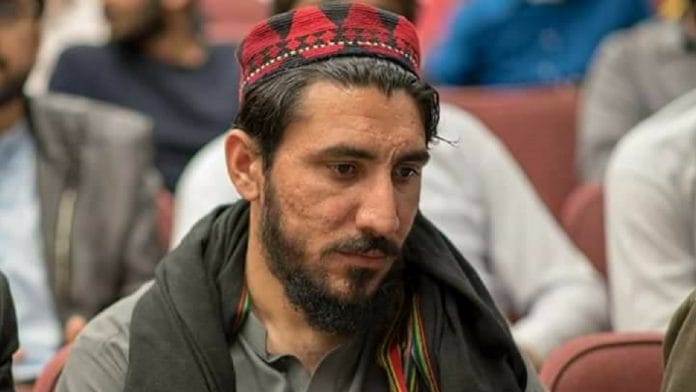Last week was yet another instance in Pakistani history when rights activists were arrested for peaceful assembly and protest — rights that are guaranteed under the Constitution.
On January 27, it was Manzoor Pashteen, the charismatic leader of the Pashtun Tahafuz Movement (PTM). On January 30, it was the turn of 23 activists as they protested Pashteen’s arrest outside the Islamabad Press Club. Among the 23 were well-known writers and activists such as Ammar Rashid and Ismat Shahjahan.
The full charge-sheet against Pashteen looks like this: Section 506 (punishment for criminal intimidation), 153-A (promoting enmity between different groups), 120-B (punishment of criminal conspiracy), 124 (sedition), and 123-A (condemning the creation of the country and advocating the abolishment of its sovereignty).
Pashteen had made some remarks in his speech during a peaceful gathering in Dera Ismail Khan that resulted in state action. The Islamabad protestors were booked for unlawful assembly, rioting — and sedition.
The Islamabad High Court (IHC) granted post-arrest bail to those arrested in the Federal capital, and the judge was informed that the treason charge was replaced by an anti-terrorism charge.
The charges laid against Pashteen and those in Islamabad are, to put it mildly, baseless. It’s not clear what exactly Pashteen said that constituted the crimes he has been accused of — the state has not presented the evidence — while no rioting took place in Islamabad. As for protesting outside press clubs, it is a time-honoured Pakistani tradition that even the right-wing engages in.
Also read: Why Manzoor Pashteen, a young Pashtun leader, is a thorn in Pakistani army’s side
One might expect a nuclear-armed state to be unbothered by a small number of citizens peacefully voicing dissent — but any speech of such nature acquires dangerous proportions for a state whose rule is founded on rights violations; when violations are the norm and not the exception. Such a state can only reaffirm its rule by further injustices.
It is not that the state does not know how to negotiate differently. It knows very well how to open dialogue — just ask the Pakistani Taliban with whom it signed peace treaty after peace treaty despite the former’s bloodletting across the country and total rejection of the Constitution; or Tehreek-e-Labbaik Pakistan (TLP), whose workers were given pocket money to end their long sit-in that blocked Islamabad not long ago.
The reason why the state turns to direct coercion against a group like PTM or the Islamabad protestors is that it does not share common ground with them; whereas the Taliban and TLP were long of use to the state for reasons well known. The state only sought to eliminate Taliban when they became too independent, and the same can be said of TLP who have come under judicial pressure recently. Pashteen and those arrested for protesting his arrest, on the other hand, are not of the same political use.
PTM is only asking for what’s in the Constitution, but the state has nothing to gain by implementing the Constitution. For if it were to do so for PTM, tomorrow the Baloch might ask for the same; Mohajirs in Karachi and Sindhis, too, might want to resort to law against extrajudicial killings, kidnappings, and denial of a free and fair trial.
Setting a precedent for accountability would come at too great a cost for a state that has, since its inception, launched five military operations in Baluchistan, three in Karachi — and not to mention the genocidal civil war in former East Pakistan. Correcting past crimes of this magnitude implies course correction going forward, but the future does not look too different. For businesses to continue as usual, the country’s path will have to be dictated by the state, not the people.
Also read: Pakistan military can’t handle growing Pashtun storm, so it’s blaming countries like India
PTM is criticized for being ‘ethnically exclusive’ but the charge is disingenuous: the demand to implement the Constitution is not an ‘ethnic demand’ but a citizens’ right. And since the Pashtun experience overlaps with that of all other minorities (and in the case of East Pakistan, majority), the issue is national.
The state, which otherwise ignores the Constitution — or, in the words of former dictator General Musharraf, considers it a piece of paper to be thrown in the bin — is all too happy to uphold it to charge Pakistanis with sedition when convenient. This cherrypicking is in line with how Pakistanis are generally treated by the state: they are asked to be loyal, but are offered no respect in return. Before the state demands allegiance from ethnic minorities, it should ask what reason has it given to them to begin with. When asking for Constitutional rights earns them the label of ‘anti-national’, what are they supposed to be loyal to?
PTM’s cause is the cause of Pakistanis. It’s an exercise in reimagining a country that has failed to equitably accommodate ethnic difference and has only dealt with it through violence to suppress it. A more just History cannot be created without the voice of the oppressed. The state knows this, which is why it wants to silence it. For now, there’s some semblance of sanity after the IHC decision, but it would be shortsighted to see it as a decisive victory. For a more fundamental shift, we need more Pashteens and more Islamabad protestors.
Jahanzeb Hussain is Founding and former Editor Prism at Dawn. Views are personal.
This article was first published on Medium.






